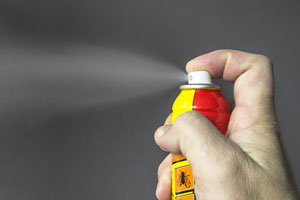
In today’s day and age, the DIY movement is more popular than ever, whether it’s gardening, arts and crafts, or home repair. But what about pest control? Let’s talk about the pros and cons. At-home remedies may seem convenient, but are they reliable? And how do the costs compare between DIY pest control and professional pest control?
Let’s talk about DIY pest control versus professional pest control and when it’s the right time for each.
Pros & Cons of DIY Pest Control
When the issue is minor or the pest is more of a nuisance than a danger, DIY pest control is a good option. When the issue is severe or the pest is more than a nuisance (e.g. termites, rodents, bed bugs), it’s probably a good idea to hire a professional exterminator so you can be sure the issue is resolved fully.
- Certain pests, such as rodents, termites, and carpenter ants are more dangerous and destructive. Getting rid of these infestations will be a challenge for any novice.
- Many store-bought products are filled with chemicals that can be dangerous for you, your family, and your pets. Always read the label and apply these products as instructed.
- Pest control technicians have experience using these products and know how to use them safely.
- At-home remedies rarely work in the long term and do not prevent future infestations.
Which Types of Pests Should You Call an Exterminator for?
Pests can be broken down into three basic types: nuisance pests, dangerous pests, and destructive pests.
Nuisance pests
Types of nuisance pests include stink bugs, silverfish, house spiders, and ants. You don’t like having them around, but it’s mainly because you don’t like seeing them.
Should you call an exterminator for nuisance pests? It’s up to you. With nuisance pests, it comes down to how much you can tolerate it.
Dangerous pests
Dangerous pests include those that could cause harm to people or pets, and that can be different for different people.
Flies and cockroaches can be dangerous because they spread bacteria that can cause illness.
Some venomous spiders can be considered dangerous. Rodents are very dangerous for the unsanitary droppings they leave. Bees and wasps can be dangerous, too, especially if you or a loved one has allergies or sensitivities.
Should you call an exterminator for dangerous pests? If you think that a pest could potentially be hazardous, you should call a professional pest control expert to make sure they’re eliminated completely.
Destructive pests
Termites are the most well-known destructive pest — they cause billions of dollars to American homeowners every year. Other examples of destructive pests include carpenter ants, carpenter bees, rodents, birds, and other wildlife.
Should you call an exterminator for destructive pests? We highly recommend it – especially for termites. Termites will continue causing damage for as long as they remain in a structure.
Does DIY Termite Control Work?
DIY termite control is not often successful. The challenge with termite control is that they like to nest deep within a structure. That makes them hard to detect, and after you’ve administered DIY treatment, it’s hard to know if you’ve eliminated the infestation.
Our experienced termite exterminators know how to locate the infestation, and exactly how to target them with state-of-the-art treatments. They can also help with lasting termite prevention, so you can feel protected months and even years from now.
Can You Do DIY Mosquito Control?
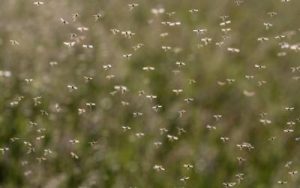 Mosquitoes are one of the most difficult pests to eliminate. There are so many of them and they breed quickly, so even if you wipe out most of them, you will still have to contend with the next generation of larvae that’s likely to emerge in a few days.
Mosquitoes are one of the most difficult pests to eliminate. There are so many of them and they breed quickly, so even if you wipe out most of them, you will still have to contend with the next generation of larvae that’s likely to emerge in a few days.
The single most effective way to limit mosquitoes in your yard is to dump out any standing water you find. Even a small amount is enough for mosquito larvae to develop. Without the water, they will die.
For adult mosquitoes, mosquito larvae, and mosquito eggs, we offer highly effective mosquito barrier treatments. If you’re planning a gathering, our mosquito control experts will also work with you to create a strategy will make sure the party isn’t crashed by mosquitoes.
Is It Time for Professional Pest Control?
When it comes down to it, no one wants to deal with pests in their home. If you want to get rid of them completely, a professional pest control company is your best bet. In the long run, a pest control professional can provide you with the tools you need to keep pests out for good.
Ready to solve your problem and stop worrying? Give Active Pest Control a call today to learn more about our hassle-free options.

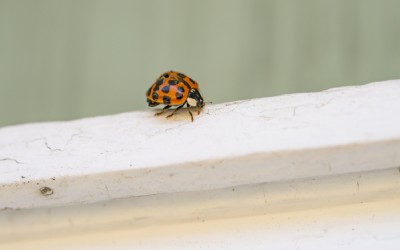
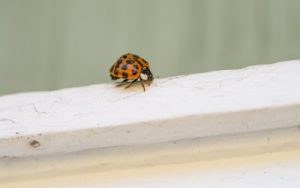
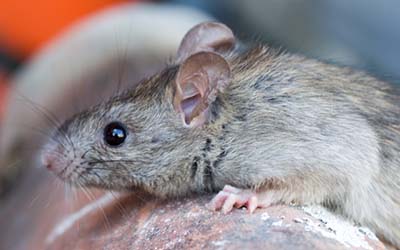 It’s fall, meaning it’s the season of the rodent! Every year in the fall and winter here in Atlanta, the number of rodent infestations goes way up. But why? As temperatures begin to dip this time of year, rat and mouse problems begin to get worse as the pests look for somewhere to bunker down for the winter. With
It’s fall, meaning it’s the season of the rodent! Every year in the fall and winter here in Atlanta, the number of rodent infestations goes way up. But why? As temperatures begin to dip this time of year, rat and mouse problems begin to get worse as the pests look for somewhere to bunker down for the winter. With 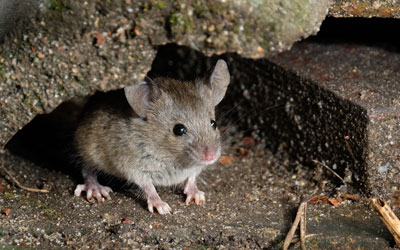 As two of the most common pest rodents, rats and mice cause a lot of trouble for Atlanta GA area homeowners. All types of rodents share a common identifying feature: their ever-growing incisor teeth. They also typically all possess short legs and a long tail, but their similarities stop there. In addition to having different characteristics, these rodents also exhibit different behaviors. A rat infestation can be much different than a mouse infestation, which is one of the reasons why it’s important to know how to tell the difference between these two. Read on for Active Pest Control’ guide to knowing if you are dealing with a mouse or a rat problem.
As two of the most common pest rodents, rats and mice cause a lot of trouble for Atlanta GA area homeowners. All types of rodents share a common identifying feature: their ever-growing incisor teeth. They also typically all possess short legs and a long tail, but their similarities stop there. In addition to having different characteristics, these rodents also exhibit different behaviors. A rat infestation can be much different than a mouse infestation, which is one of the reasons why it’s important to know how to tell the difference between these two. Read on for Active Pest Control’ guide to knowing if you are dealing with a mouse or a rat problem.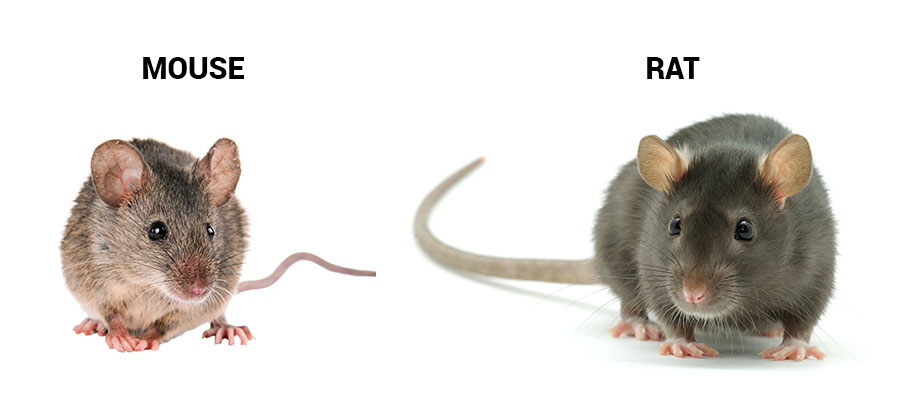
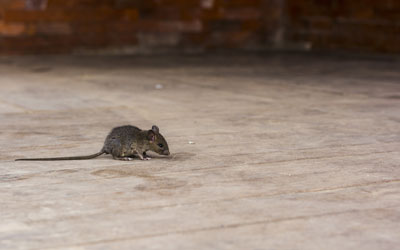 It’s Rodent Awareness Week, and rodent infestations are on the rise. Due to the pandemic, reports of rodent sightings have surged. But why? Back when the coronavirus hit and restaurants began to shutter, rats and mice were suddenly deprived of their food sources. Especially here in Atlanta, this led to more infestations as rodents entered residential homes in search of resources. With the seasons changing as we speak, rodents during the pandemic are even more inclined to be indoors this time of year to stay warm. With infestations on the rise during the pandemic, now is the time to learn how to effectively prevent rodent problems in your property. The team at Active Pest Control is here to help.
It’s Rodent Awareness Week, and rodent infestations are on the rise. Due to the pandemic, reports of rodent sightings have surged. But why? Back when the coronavirus hit and restaurants began to shutter, rats and mice were suddenly deprived of their food sources. Especially here in Atlanta, this led to more infestations as rodents entered residential homes in search of resources. With the seasons changing as we speak, rodents during the pandemic are even more inclined to be indoors this time of year to stay warm. With infestations on the rise during the pandemic, now is the time to learn how to effectively prevent rodent problems in your property. The team at Active Pest Control is here to help. Spring is almost here, which means pests are on their way! While pest problems are a fact of life in Georgia year-round, springtime sees a big fluctuation in pest problems. This is because many pests that are less active throughout the winter are encouraged by warming temperatures to start invading homes again. To keep spring pests out of your property, it’s important to prepare your home now! Keep reading for tips from the experts at Active Pest Control.
Spring is almost here, which means pests are on their way! While pest problems are a fact of life in Georgia year-round, springtime sees a big fluctuation in pest problems. This is because many pests that are less active throughout the winter are encouraged by warming temperatures to start invading homes again. To keep spring pests out of your property, it’s important to prepare your home now! Keep reading for tips from the experts at Active Pest Control.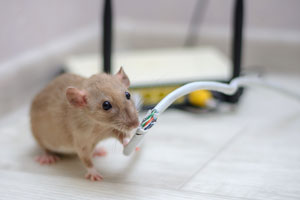 A rodent infestation is any homeowner’s worst nightmare. Not only are they gross and messy—there are many dangers of rodents to be aware of!
A rodent infestation is any homeowner’s worst nightmare. Not only are they gross and messy—there are many dangers of rodents to be aware of!  No one wants to deal with a mice infestation. Mice are a dreaded household pest because they spread disease and filth. Some of the signs you may have a
No one wants to deal with a mice infestation. Mice are a dreaded household pest because they spread disease and filth. Some of the signs you may have a  Many people think pest problems only occur in the summer, but rodent infestations are very common in the winter! According to The National Pest Management Association (NPMA), 21 million homes in the U.S. are invaded by rodents each winter. As temperatures drop, rats and mice will look to make their way indoors for warmth and shelter. To avoid the diseases and destruction brought from rodent infestations, it’s important to implement rodent control into your home each year. Keep reading for Active Pest Control’s top tips for rats and mice prevention in the winter.
Many people think pest problems only occur in the summer, but rodent infestations are very common in the winter! According to The National Pest Management Association (NPMA), 21 million homes in the U.S. are invaded by rodents each winter. As temperatures drop, rats and mice will look to make their way indoors for warmth and shelter. To avoid the diseases and destruction brought from rodent infestations, it’s important to implement rodent control into your home each year. Keep reading for Active Pest Control’s top tips for rats and mice prevention in the winter.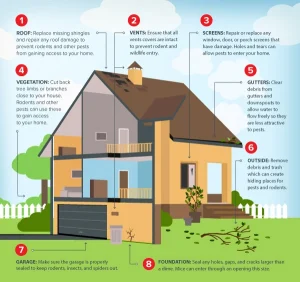 There are eight spots in particular around your property that are vulnerable to rodent intrusions. By routinely checking the following areas, you can locate where rats and mice may attempt to make their way indoors. It’s important to make any repairs promptly and, in general, keep a tidy home and yard to prevent rodents. The eight main locations to check and make repairs include:
There are eight spots in particular around your property that are vulnerable to rodent intrusions. By routinely checking the following areas, you can locate where rats and mice may attempt to make their way indoors. It’s important to make any repairs promptly and, in general, keep a tidy home and yard to prevent rodents. The eight main locations to check and make repairs include: